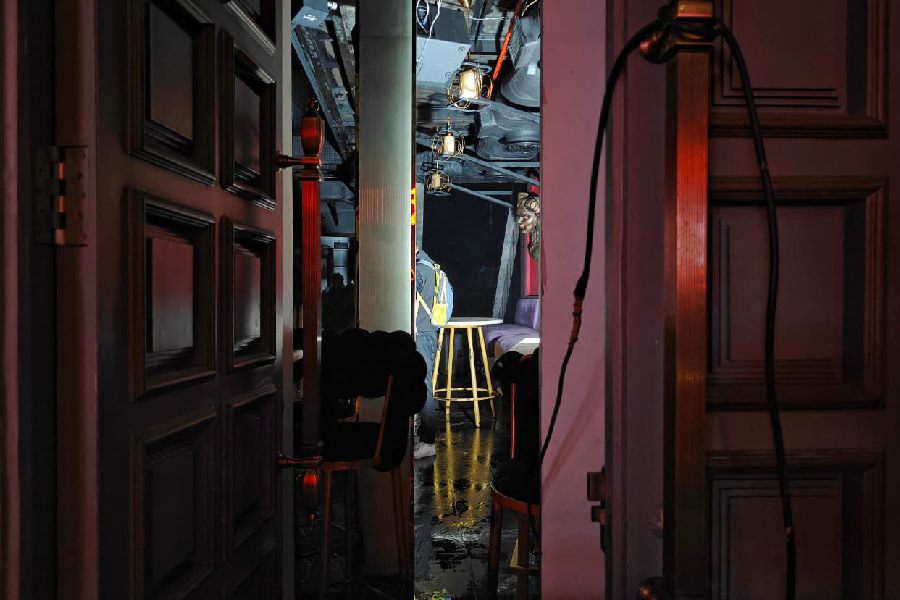|
|
| Raj and Romesh Thapar |
The year happens to be the anniversary occasion for two journals, both quite out of the ordinary. The formidable Economic (now Economic and Political) Weekly completed 60 years of its existence in January. September marked half-a-century of publication of that curiosum of a periodical, Seminar. The EPW’s deft blending of serious academic thinking with incisive critiques of contemporary goings-on is non pareil in the world. Seminar too, in its own manner, stands out as a spectacular phenomenon. It presents in its pages diverse musings on a single theme, and each month it is a new theme. This has been the proceeding, month after month, across six hundred-odd issues. A further overlap between the EPW and the Seminar is that both started as cottage craft, a small-scale family affair. The EPW was a brainwave of two brothers, Sachin and Hiten Chaudhuri; Seminar, on the other hand, was the handiwork of a husband-and-wife team.
Lahore Government College, in the early 1940s, used to fawn on the boys and girls attending it from affluent, and perhaps not so affluent, families. They crammed its sprawling lawns, corridors and lecture rooms. Spring was always in the air: excited roaming in literature and political philosophy, intense discussion on the mysteries of the atom, loads and loads of Faiz’s poetry, thrill at reports of heroic Soviet résistance, at Stalingrad and elsewhere, against the advancing Nazi aggressors. It was almost inevitable that Raj Malhotra and Romesh Thapar would be sucked into the Students’ Federation and the proximity of the communist party. Romesh had a flair for writing, drawing and acting, his calligraphy was beautiful, Raj had elegance and, apart from her passion for art and aesthetics, was full of ideas. The sufferings and deprivation of the poor hurt their sensibility; the courting couple dreamed of a future exclusively dedicated to the cause of the people. The Indian People’s Theatre Movement was then a vibrant, thriving organism. It was sheer joy to be part of it. It also taught Raj and Romesh the virtues of method and discipline.
With Partition, Lahore could no longer provide a base. They married early and moved to Bombay, possibly because it was the headquarters of the IPTA. Romesh had his hands full with writing, producing documentary films, acting, even performing cameo roles in one or two Bombay films. Raj did her comradely bits. The Ranadive phase brought an end to that chapter. The IPTA was in disarray, Raj turned to looking after the household and rearing the children, Romesh pottered around, contributing to this or that newspaper, producing an impulsive book on the national political scene, getting a shade disenchanted with films and plays. Then a thing happened. They befriended Sachin Chaudhuri, or it could have been the other way round. Sachin Chaudhuri was a beguiling guest in all seasons; Raj and Romesh were wonderful hosts. The format and contents of the Economic Weekly fascinated them. What about embarking on an adventure along the same direction as Sachin’s, starting a journal which would be socially relevant and yet have a persona of its own, flaunting a predilection for intellectual rigour but not at all airy-fairy, and with a focus on concrete issues? A weekly publication invited a thousand headaches; why not, instead, a monthly publication? Choose for each month a particular topic and invite a dozen or thereabouts of knowledgeable people to expand their thoughts around it? In a university or college seminar, one speaker usually makes an introductory presentation, which is followed by comments from others attending, and, after some meandering, the discussion reaches a dénouement, or sometimes — no harm done — does not. The 1950s, it needs to be remembered, were the decade of panchsheel. Mao Zedong and Chou En Lai were much admired names in this country, Mao’s edict of allowing a hundred thoughts to contend had bowled over the Indian middle class. Constituents of this class were, more often than not, wont to take themselves excessively seriously. Seminar did not mind, to each his or her ego. Seminar delightfully carried the burden of both naïveté and pseudo-sophistication in its issues. The strategy was to leave it to the readers to separate the wheat from the chaff. It had, however, something additional to offer: reviews of books touching on the month’s theme and a carefully composed bibliography of relevant literature. Could one ask for more?
The range of subjects Seminar has coped with over these decades nearly takes one’s breath away: politics, economics, international relations, Pakistan, the liberation of Bangladesh, anthropology, sociology, atomic energy, literature, sports, psephology, problems of individual political parties, national security, Kashmir, Centre-state relations, public finance, police reforms, public undertakings, globalization, the poverty level, urban planning, housing and architecture, the food crisis, agriculture and land reforms, trade unions, the Naxalites, the Green Movement, archaeology, global warming — one can go on and on. A new month, a new theme, now and then, return to an old theme at an interval of 10 or 15 years.
Like the Economic Weekly, Seminar too had its blooding in Bombay. While Sachin Chaudhuri and his weekly dug roots in Apollo Bunder, the Thapars soon moved to New Delhi where the climate was perhaps marginally less commercial, if marginally more bureaucratic. Because of their wide social connections, Romesh and Raj could afford not to worry over bureaucratic artefacts. In any case, everybody knew everybody else in New Delhi’s upper layers; that social reality permitted Raj and Romesh to invite, with confidence, all and sundry to partake of the eclectic fare they served.
For it is not just the range of issues Seminar has expatiated on that overwhelms. Equally impressive is the range of people who have written for it: politicians (ministers not excluded), civil servants, major domos and prima donnas from different sections of the academia, economists, sociologists, physicists, mathematicians, anthropologists, defence strategists, film stars, art critics, danseuses, thespians, civil society activists, architects, city planners, diplomats, sports personalities, defunct and still active revolutionaries. Much of this was possible on account of the concept of Seminar which attracted persons with different backgrounds and experience. Romesh’s grit and persuasive power, supplemented by Raj’s charm, did the rest.
Both the Economic Weekly and Seminar were initiated as exercises in the small scale. The Economic Weekly, despite its founder’s great reluctance, had to transform itself in the middle of life; the romanticism of running an enterprise on a shoestring basis needed to be abandoned; its social relevance called for that change. The EPW therefore broke out of the contours of cottage existence. Although it remains under the care of a private trust, it has increasingly accepted some of the constraints of a near-corporate entity even while jealously preserving its freewheeling left-liberal outlook. Since the Thapars had ample private means and it was only a monthly publication, Seminar did not have to take the EPW route. It is content to stay small-scale, it has changed neither its format nor its textual contents. Raj and Romesh are gone, the progeny has taken it over, the daughter and son-in-law duo run it with the same quiet efficiency that has been the hallmark of Seminar from the very first issue of September 1959.
It is, however, a new generation. While Seminar remains essentially the same, in some details it is a teeny-weeny bit different. The globalized environment provokes new challenges, which has to get reflected in the themes Seminar chooses to accommodate, it has to, to be contemporary. It has, therefore, both changed, and not changed; let it be left at that.
Seminar, of course, spells continuity. It would, however, be a very odd sort of obliviousness not to mention an interruption in its being. This happened during Indira Gandhi’s Emergency. Romesh and Raj abhorred the idea of submitting matter intended for publication in Seminar to the queen’s censure. They preferred to close down the journal. Not too many were prepared to follow their example. Seminar remains unique in that respect too.
For an old-timer, what at the end matters, though, is nostalgia, nostalgia which takes one back perhaps two score years, nostalgia for the neat little Seminar office on the first floor of Malhotra Building, its cool interior décor, Romesh, with his half-grin, half-grimace and rich baritone, commanding the visiting friend to take a seat and listen to his latest political grouse, Raj, ever full of tact, grace and affection, trying to rescue the friend from Romesh’s overdrive and fill him with the most recent New Delhi gossip — or, better still, organize, right in the office premises, an impromptu lunch of luscious ravioli.












